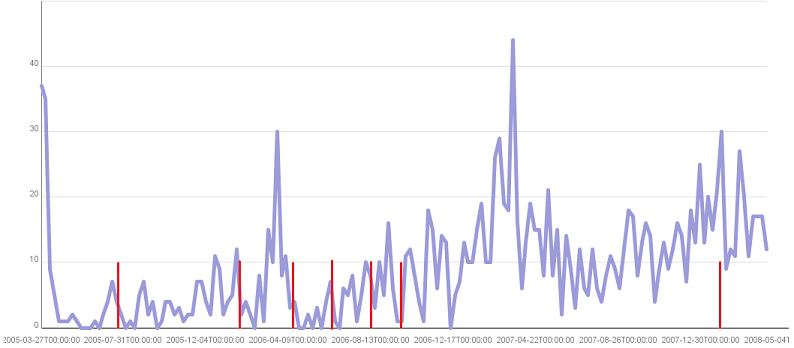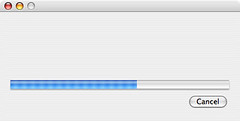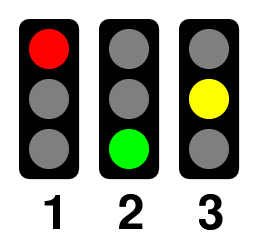I've had a little fun messing around with Photosynth, a Microsoft research project turned into a Live service. You upload a bunch of photos from around the same area and it makes a 3D panorama out of them. For instance, here's National Geographic's photosynth of the sphinx and pyramids in Egypt. Messing around with this I've made one of half a vase of roses, and a larger photosynth of my office.

While re-reading Cryptonomicon I thought about what kind of information I'm leaking by posting links on Delicious. At work I don't post any Intranet websites for fear of revealing anything but I wondered if not posting would reveal anything. For instance, if I'm particularly busy at work might I post less indicating something about the state of the things I work on? I got an archive of my Delicious posts via the Delicious API and then ran it through a tool I made to create a couple of tables which I've graphed on Many Eyes



![[The cover of Cryptonomicon]](http://images.amazon.com/images/P/0380788624.01._SX140_SCLZZZZZZZ_.jpg)
![[The cover of Quicksilver]](http://images.amazon.com/images/P/0060593083.01._SX140_SCLZZZZZZZ_.jpg)
![[The cover of The Confusion]](http://images.amazon.com/images/P/0060733357.01._SX140_SCLZZZZZZZ_.jpg)
![[The cover of The System of the World]](http://images.amazon.com/images/P/0060750863.01._SX140_SCLZZZZZZZ_.jpg)
I've finally finished the Baroque Cycle, a historical fiction series set in the 17th and 18th centuries by Neal Stephenson whose work I always enjoy. There were often delays where I'd forget about the books until I had to take plane somewhere, or get discouraged reading about the character's thoughts on economics, or have difficulty finding the next volume, or become more engrossed in other books, projects or video games, and leave the Baroque Cycle books untouched for many months at a time. Consequently, my reading of this series has, I'm ashamed to say, spanned years. After finishing some books which I enjoy I end up hungry for just a bit more to read. For this series I don't need a bit more to read, I'm done with that, but I do want a badge or maybe a medal. Or barring that, college credit in European History and Macro Economics. I can recommend this book to anyone who has enjoyed Neal Stephenson's other work and has a few years of free time to kill.
 More of my thoughts have been stolen: In my
previous job the customer wanted a progress bar displayed while information was copied off of proprietary hardware, during which the software didn't get any indication of progress until the copy
was finished. I joked (mostly) that we could display a progress bar that continuously slows down and never quite reaches the end until we know we're done getting info from the hardware. The amount
of progress would be a function of time where as time approaches infinity, progress approaches a value of at most 100 percent.
More of my thoughts have been stolen: In my
previous job the customer wanted a progress bar displayed while information was copied off of proprietary hardware, during which the software didn't get any indication of progress until the copy
was finished. I joked (mostly) that we could display a progress bar that continuously slows down and never quite reaches the end until we know we're done getting info from the hardware. The amount
of progress would be a function of time where as time approaches infinity, progress approaches a value of at most 100 percent.
This is similar to Zeno's Paradox which says you can't cross a room because to do so first you must cross half the room, then you must cross half the remaining distance, then half the remaining again, and so on which means you must take an infinite number of steps. There's also an old joke inspired by Zeno's Paradox. The joke is the prototypical engineering vs sciences joke and is moderately humorous, but I think the fact that Wolfram has an interactive applet demonstrating the joke is funnier than the joke itself.
I recently found Lou Franco's blog post "Using Zeno's Paradox For Progress Bars" which covers the same concept as Zeno's Progress Bar but with real code. Apparently Lou wasn't making a joke and actually used this progress bar in an application. A progress bar that doesn't accurately represent progress seems dishonest. In cases like the Vista Defrag where the software can't make a reasonable guess about how long a process will take the software shouldn't display a progress bar.
Similarly a paper by Chris Harrison "Rethinking the Progress Bar" suggests that if a progress bar speeds up towards the end the user will perceive the operation as taking less time. The paper is interesting, but as in the previous case, I'd rather have progress accurately represented even if it means the user doesn't perceive the operation as being as fast.
Update: I should be clearer about Lou's post. He was actually making a practical and implementable suggestion as to how to handle the case of displaying progress when you have some idea of how long it will take but no indications of progress, whereas my suggestion is impractical and more of a joke concerning displaying progress with no indication of progress nor a general idea of how long it will take.
More ideas stolen from me in the same vein as my stolen OpenID thoughts.
 Fast
Pedestrian Crossing on Four Way Stops. In college I didn't have a car and every weekend I had weekly poker with friends who lived nearby so I would end up waiting to cross from one corner of a
traffic lit four way stop to the opposite corner. Waiting there in the cold gave me plenty of time to consider the fastest method of getting to the opposite corner of a four-way stop. My plan was
to hit the pedestrian crossing button for both directions and travel on the first one available. This only seems like a bad choice if the pedestrian crossing signal travels clockwise or counter
clockwise around the four way stop. In those two cases its better to take the later of the two pedestrian signal crossings, but I have yet to see those two patterns on a real life traffic stop. I
decided recently to see if my plan was actually sound and looked up info on traffic signals. But the info
didn't say much other than "its complicated" and "it depends" (I'm paraphrasing). Then I found some guy's analysis of this problem. So I'm done with this and I'll continue pressing both
buttons and crossing on the first pedestrian signal. Incidentally on one such night when I was waiting to cross this intersection I heard a loud multi-click sound and realized that the woman in the
SUV waiting to cross the intersection next to me had just locked her doors. I guess my thinking-about-crossing-the-street face is intimidating.
Fast
Pedestrian Crossing on Four Way Stops. In college I didn't have a car and every weekend I had weekly poker with friends who lived nearby so I would end up waiting to cross from one corner of a
traffic lit four way stop to the opposite corner. Waiting there in the cold gave me plenty of time to consider the fastest method of getting to the opposite corner of a four-way stop. My plan was
to hit the pedestrian crossing button for both directions and travel on the first one available. This only seems like a bad choice if the pedestrian crossing signal travels clockwise or counter
clockwise around the four way stop. In those two cases its better to take the later of the two pedestrian signal crossings, but I have yet to see those two patterns on a real life traffic stop. I
decided recently to see if my plan was actually sound and looked up info on traffic signals. But the info
didn't say much other than "its complicated" and "it depends" (I'm paraphrasing). Then I found some guy's analysis of this problem. So I'm done with this and I'll continue pressing both
buttons and crossing on the first pedestrian signal. Incidentally on one such night when I was waiting to cross this intersection I heard a loud multi-click sound and realized that the woman in the
SUV waiting to cross the intersection next to me had just locked her doors. I guess my thinking-about-crossing-the-street face is intimidating.
 Windows Searching
Windows Media Center Recorded TV's Closed Captions. An Ars-Technica article on
a fancy DVR described one of the DVRs features: full text search over the subtitles of the recorded TV shows. I thought implementing this for Windows Media Center recorded TV shows and Windows
Search would be an interesting project to learn about video files, and extending Windows Search. As it turns out though some guy, Stephen Toub implemented Windows Search over MCE closed captions already. Stephen Toub's article is very long and describes some
other very interesting related projects including 'summarizing video files' which you may want to read.
Windows Searching
Windows Media Center Recorded TV's Closed Captions. An Ars-Technica article on
a fancy DVR described one of the DVRs features: full text search over the subtitles of the recorded TV shows. I thought implementing this for Windows Media Center recorded TV shows and Windows
Search would be an interesting project to learn about video files, and extending Windows Search. As it turns out though some guy, Stephen Toub implemented Windows Search over MCE closed captions already. Stephen Toub's article is very long and describes some
other very interesting related projects including 'summarizing video files' which you may want to read.